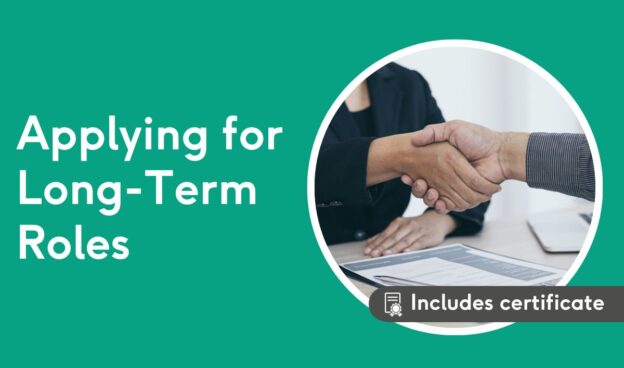This course is your one-stop-shop when applying for long-term roles. You will find lessons that give you an overview to the process, the steps you need to follow and top tips for success. Watch the videos, read the material and use the templates.
Whether you are a member of our Opogo community or looking to find that long-term role, hear from Phil Denton, former headteacher, what schools look for when they are reviewing applications for long-term positions.
When schools review applications for long-term roles, they seek candidates who embody a combination of educational qualifications, professional experience, and personal attributes that align with the institution’s values and educational goals. Academic credentials, such as degrees and certifications, are obviously important and make you qualified for the role.
In addition, schools typically look for candidates who possess relevant subject and teaching & learning skills, ensuring they can effectively teach and inspire children and young people. Professional experience plays a crucial role, with schools favouring candidates who have demonstrated success in previous teaching or administrative roles.
A track record of positive contributions to the school community, innovative teaching methodologies, and effective classroom management is highly valued. This also says a lot about your commitment to the wider education of your students.
Furthermore, schools assess applicants based on their alignment with the institution’s mission and values. You can begin your application journey by really understanding what a school is all about and then explaining how their educational philosophy and yours are aligned.
A commitment to fostering a positive and inclusive learning environment, dedication to continuous professional development, and a collaborative mindset are often emphasised. For example, talk about your work with children and young people with SEND or those from disadvantaged backgrounds.
Strong interpersonal and communication skills are essential for building relationships with students, parents, and colleagues. In addition to tangible qualifications, schools consider intangible qualities such as adaptability, resilience, and a passion for education. The ability to contribute to extracurricular activities, a commitment to student well-being, and a willingness to engage in ongoing professional growth are attributes that can set candidates apart in the competitive landscape of education.
Ultimately, schools aim to select individuals who not only meet the academic and professional criteria but also embody the values and ethos of the educational institution.
In the materials section of this course, you will find the following documents to help you:
- Curriculum Vitae Template
- Top Tips for Online Interviews
- Q&A guide to teacher interviews
So, let’s get started; the video below offers guidance for preparing for interview and the approach you can take on interview day. The additional lessons will give you more guidance relating to the Opogo process and compliance requirements, to help you get the role you are looking for.


